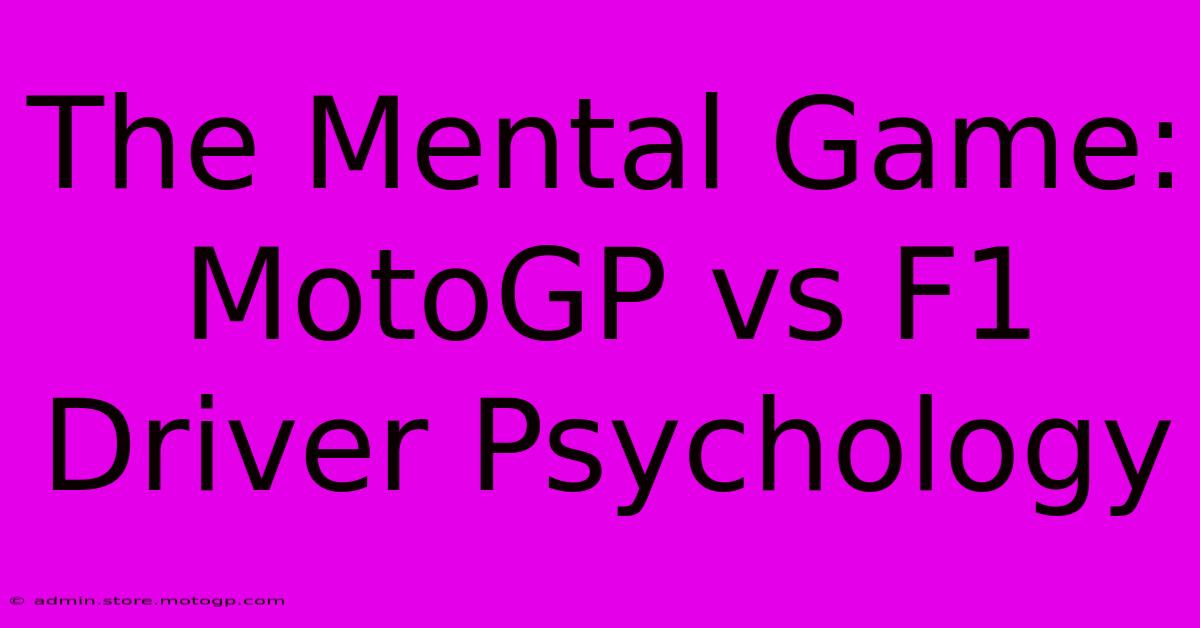The Mental Game: MotoGP Vs F1 Driver Psychology

Table of Contents
The Mental Game: MotoGP vs F1 Driver Psychology
The roar of the crowd, the screech of tires, the adrenaline surge – Formula 1 and MotoGP share a thrilling, high-octane atmosphere. But beyond the speed and spectacle lies a crucial difference: the mental game. While both require exceptional skill and physical prowess, the psychological demands on drivers in these two motorsport giants differ significantly. This article delves into the unique mental challenges faced by MotoGP and F1 drivers, comparing and contrasting their psychological profiles and the strategies they employ to succeed.
The Razor's Edge: High-Risk, High-Reward Psychology
Both F1 and MotoGP drivers operate under immense pressure. A single mistake can have devastating consequences. However, the nature of that risk varies.
MotoGP: The Dance with Death
MotoGP riders experience a far more intimate and visceral connection with risk. They're exposed, vulnerable, and at the mercy of unforgiving physics. A crash is not just a setback; it's a potentially life-altering event. This constant awareness of mortality demands a unique mental fortitude. MotoGP drivers must possess:
- Exceptional Courage and Fear Management: The sheer physical danger necessitates a high tolerance for risk and the ability to control fear, channeling it into focus rather than paralysis.
- Unwavering Focus and Concentration: The fast-paced, chaotic nature of MotoGP demands laser-sharp concentration over extended periods. A momentary lapse can have catastrophic results.
- Adaptability and Resilience: Track conditions, bike setup, and even competitor strategies can change rapidly. MotoGP riders must adapt quickly and bounce back from setbacks with unwavering determination.
F1: Precision, Strategy, and Pressure
While F1 drivers also face significant risk, their environment offers a greater sense of control. The cockpit provides a degree of protection, and the cars are more forgiving in terms of handling. The psychological demands are more centered on:
- Strategic Thinking and Racecraft: F1 is a complex strategic game. Drivers must manage tire wear, fuel consumption, and race strategy effectively, often under immense pressure from their team and competitors.
- Consistency and Precision: F1 racing rewards consistent performance and precision driving. Drivers need to be able to deliver lap after lap without making mistakes, even when fatigue sets in.
- Pressure Management Under Scrutiny: The intense media attention and the enormous pressure from teams and sponsors add another layer of complexity to the mental game in F1.
Mental Training: Different Approaches, Similar Goals
Both MotoGP and F1 drivers utilize mental training techniques to optimize their performance. However, the emphasis may differ slightly based on the specific challenges of each discipline.
Visualization and Mindfulness: A Shared Toolset
Visualization is crucial for both. Mentally rehearsing race scenarios, mastering corners, and managing pressure situations helps build confidence and improve performance. Mindfulness techniques, promoting focus and reducing anxiety, are also commonly employed.
Specific Training Differences:
- MotoGP: Focuses heavily on body awareness, proprioception (awareness of body position), and risk assessment. They might incorporate techniques to manage fear and enhance reflexes.
- F1: Emphasizes strategic thinking, decision-making under pressure, and managing the intense media scrutiny. They might engage in simulations to practice race strategies and improve their decision-making skills.
The Winning Mindset: Shared Traits
Despite the differences, both MotoGP and F1 drivers share certain crucial mental attributes:
- Self-belief and unwavering confidence: A strong sense of self-belief is critical to overcome challenges and maintain focus under pressure.
- Resilience and ability to learn from mistakes: Both disciplines demand the ability to learn from failures, adapt, and improve consistently.
- Mental toughness and determination: The relentless pursuit of excellence requires unwavering mental toughness and the determination to push boundaries.
Conclusion: A Masterclass in Mental Fortitude
The mental game in both MotoGP and F1 is as crucial as the physical skill. While the specific challenges and training techniques may differ, the underlying principles of mental resilience, focus, and adaptability are paramount to success. Both sets of drivers represent the pinnacle of human performance, showcasing the remarkable power of the human mind to conquer seemingly insurmountable odds. Their psychological journeys offer fascinating insights into what it takes to thrive in the extreme pressure cooker of elite motorsport.

Thank you for visiting our website wich cover about The Mental Game: MotoGP Vs F1 Driver Psychology. We hope the information provided has been useful to you. Feel free to contact us if you have any questions or need further assistance. See you next time and dont miss to bookmark.
Featured Posts
-
Yamaha V4 Moto Gp The Riders Ultimate Machine
Feb 18, 2025
-
Famous Motorcycle Riders And Their Social Impact
Feb 18, 2025
-
Us Grand Prix Sprint Time The Power Of Speed
Feb 18, 2025
-
Formula 1 Shuttle The Ultimate Cota Experience
Feb 18, 2025
-
Cota Parking Secure Your Spot Now
Feb 18, 2025
